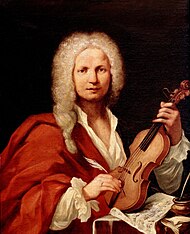Nerone fatto Cesare
| Antonio Vivaldi | ||
|---|---|---|
 | ||
| ||
Nerone fatto Cesare er en tabt opera med betegnelsen dramma per musica af Antonio Vivaldi.
Opførelseshistorie
Operaen blev uropført på Teatro Sant'Angelo i Venedig under karnevallet i 1715.[1] Den blev genopført (med mange nye arier) på Accademia i Brescia under karnevallet i 1716.
Roller
| Rolle | Stemmetype | Originalbesætning, 1715 |
|---|---|---|
| Zelto | Florido Matteucci | |
| Seneca | Antonio Francesco Carli | |
| Pallante Ministro | Andrea Pacini | |
| Ate Liberta | Francesco Natali | |
| Gusmano, ambassadør | Francesco Natali | |
| Tigrane, konge af Armenien | Elisabetta Denzio | |
| Nerone, hans søn | Anna Maria Fabbri | |
| Agrippina Imperatrix | Margherita Ingualandi |
Referencer
- ^ Italianopera.org Arkiveret 28. september 2011 hos Wayback Machine.
Medier brugt på denne side
"An anonymous portrait in oils in the Museo Internazionale e Biblioteca della Musica di Bologna is generally believed to be of Vivaldi and may be linked to the Morellon La Cave engraving, which appears to be a modified mirror reflection of it. It is striking how the engraving and the painting 'secularize' Vivaldi: they contain no hint of his identity as a priest. (The fashionable, though slightly informal, dress and self-confident attitude of the composer resemble very closely those of Telemann in the well-known engraving by Georg Lichtensteger.) Ghezzi's sketch likewise shows Vivaldi in a non-clerical black stock as opposed to the white clerical stock and still wearing a wig. (Two years later, in the anno santo of 1725, Innocent XIII was to ban the wearing of wigs by priests.) There is disagreement over whether the hint of red showing in front of the centre of the composer's wig in the painting is a sly reference to his famous hair-colour or simply an unpainted part of the canvas. Whatever the case, it is not out of place to observe that, contrary to the belief of many modern illustrators, Vivaldi's wigs were never coloured red." Michael Talbot, The Vivaldi Compendium (2011), p. 148. The proposition that the painting actually depicts Antonio Vivaldi has been questioned by some sources (e.g. by Groves dictionary).
